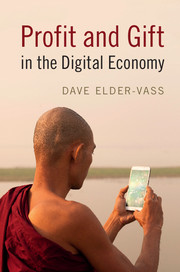7 - Co-operative peer production: Wikipedia
from Part III - Digital economies
Published online by Cambridge University Press: 05 July 2016
Summary
Introduction
Like the iPhone, Wikipedia is ubiquitous. In October 2014, the English-language version was viewed over 8.5 million times per hour, and the other 286 language versions collectively were viewed over 9 million times per hour – a total of over twelve billion views per month (Wikimedia, 2014b). With over 4.7 million articles, English Wikipedia is not only the most heavily used but also the largest encyclopaedia the world has ever seen (Dalby, 2009, p. 42). Unlike Apple, however, Wikipedia makes no profit and is worth nothing on the stock market. Although it now pays salaries to over 100 staff at the Wikimedia Foundation (Orlowski, 2012), other than this Wikipedia is a particularly pure case of the gift economy in action. It is created entirely by unpaid volunteers, and indeed anyone can edit (almost) any Wikipedia page. It is run with minimum levels of formal hierarchy, with disputes being resolved largely by the achievement of consensus under the guidance of a well-developed set of normative standards, and only rarely by the intervention of administrators, who are themselves volunteers selected on the basis of their previous contributions to the project (Forte Larco & Bruckman, 2009). Its product is freely available to anyone who chooses to make use of it. At the time of writing it is the seventh most visited site on the Web (Alexa.com, 2015) but its running costs are remarkably low given the enormous levels of usage and are met entirely by soliciting voluntary donations, indeed the site does not even accept advertising. This is a spectacularly different economic model than monopoly capitalism, and yet it coexists quite stably alongside it.
In the last chapter, we fell easily into some conventional assumptions about what sorts of benefits and harms a political economy should explain and evaluate. Apple and other companies make profits; consumers enjoy useful products; workers receive wages and suffer alienating workloads. All of these are grist to the mill of the old political economies, though they differ in how much attention they pay to each and in how they account for them. But different complexes of appropriative practices generate different kinds of benefits and harms, requiring different kinds of explanations and evaluations, and here we are on ground that is much less familiar to the old political economies.
- Type
- Chapter
- Information
- Profit and Gift in the Digital Economy , pp. 144 - 170Publisher: Cambridge University PressPrint publication year: 2016



